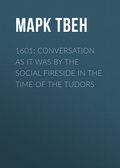
Марк Твен
The Tragedy of Pudd'nhead Wilson
CHAPTER III.
Roxy Plays a Shrewd Trick
Whoever has lived long enough to find out what life is, knows how deep a debt of gratitude we owe to Adam, the first great benefactor of our race. He brought death into the world.– Pudd’nhead Wilson’s Calendar.
Percy Driscoll slept well the night he saved his house-minions from going down the river, but no wink of sleep visited Roxy’s eyes. A profound terror had taken possession of her. Her child could grow up and be sold down the river! The thought crazed her with horror. If she dozed and lost herself for a moment, the next moment she was on her feet flying to her child’s cradle to see if it was still there. Then she would gather it to her heart and pour out her love upon it in a frenzy of kisses, moaning, crying, and saying, “Dey sha’n’t, oh, dey sha’n’t!– yo’ po’ mammy will kill you fust!”
Once, when she was tucking it back in its cradle again, the other child nestled in its sleep and attracted her attention. She went and stood over it a long time communing with herself:
“What has my po’ baby done, dat he couldn’t have yo’ luck? He hain’t done noth’n’. God was good to you; why warn’t he good to him? Dey can’t sell you down de river. I hates yo’ pappy; he hain’t got no heart – for niggers he hain’t, anyways. I hates him, en I could kill him!” She paused awhile, thinking; then she burst into wild sobbings again, and turned away, saying, “Oh, I got to kill my chile, dey ain’t no yuther way, – killin’ him wouldn’t save de chile fum goin’ down de river. Oh, I got to do it, yo’ po’ mammy’s got to kill you to save you, honey” – she gathered her baby to her bosom, now, and began to smother it with caresses – “Mammy’s got to kill you – how kin I do it! But yo’ mammy ain’t gwine to desert you – no, no; dah, don’t cry – she gwine wid you, she gwine to kill herself too. Come along, honey, come along wid mammy; we gwine to jump in de river, den de troubles o’ dis worl’ is all over – dey don’t sell po’ niggers down the river over yonder.”
She started toward the door, crooning to the child and hushing it; midway she stopped, suddenly. She had caught sight of her new Sunday gown – a cheap curtain-calico thing, a conflagration of gaudy colors and fantastic figures. She surveyed it wistfully, longingly.
“Hain’t ever wore it yet,” she said, “en it’s jist lovely.” Then she nodded her head in response to a pleasant idea, and added, “No, I ain’t gwine to be fished out, wid everybody lookin’ at me, in dis mis’able ole linsey-woolsey.”
She put down the child and made the change. She looked in the glass and was astonished at her beauty. She resolved to make her death-toilet perfect. She took off her handkerchief-turban and dressed her glossy wealth of hair “like white folks”; she added some odds and ends of rather lurid ribbon and a spray of atrocious artificial flowers; finally she threw over her shoulders a fluffy thing called a “cloud” in that day, which was of a blazing red complexion. Then she was ready for the tomb.
She gathered up her baby once more; but when her eye fell upon its miserably short little gray tow-linen shirt and noted the contrast between its pauper shabbiness and her own volcanic irruption of infernal splendors, her mother-heart was touched, and she was ashamed.
“No, dolling, mammy ain’t gwine to treat you so. De angels is gwine to ’mire you jist as much as dey does yo’ mammy. Ain’t gwine to have ’em putt’n’ dey han’s up ’fo’ dey eyes en sayin’ to David en Goliah en dem yuther prophets, ‘Dat chile is dress’ too indelicate fo’ dis place.’”
By this time she had stripped off the shirt. Now she clothed the naked little creature in one of Thomas à Becket’s snowy long baby-gowns, with its bright blue bows and dainty flummery of ruffles.
“Dah – now you’s fixed.” She propped the child in a chair and stood off to inspect it. Straightway her eyes began to widen with astonishment and admiration, and she clapped her hands and cried out, “Why, it do beat all! – I never knowed you was so lovely. Marse Tommy ain’t a bit puttier – not a single bit.”
She stepped over and glanced at the other infant; she flung a glance back at her own; then one more at the heir of the house. Now a strange light dawned in her eyes, and in a moment she was lost in thought. She seemed in a trance; when she came out of it she muttered, “When I ’uz a-washin’ ’em in de tub, yistiddy, his own pappy asked me which of ’em was his’n.”
She began to move about like one in a dream. She undressed Thomas à Becket, stripping him of everything, and put the tow-linen shirt on him. She put his coral necklace on her own child’s neck. Then she placed the children side by side, and after earnest inspection she muttered —
“Now who would b’lieve clo’es could do de like o’ dat? Dog my cats if it ain’t all I kin do to tell t’other fum which, let alone his pappy.”
She put her cub in Tommy’s elegant cradle and said —
“You’s young Marse Tom fum dis out, en I got to practise and git used to ’memberin’ to call you dat, honey, or I’s gwine to make a mistake some time en git us bofe into trouble. Dah – now you lay still en don’t fret no mo’, Marse Tom – oh, thank de good Lord in heaven, you’s saved, you’s saved! – dey ain’t no man kin ever sell mammy’s po’ little honey down de river now!”
She put the heir of the house in her own child’s unpainted pine cradle, and said, contemplating its slumbering form uneasily —
“I’s sorry for you, honey; I’s sorry, God knows I is, – but what kin I do, what could I do? Yo’ pappy would sell him to somebody, some time, en den he’d go down de river, sho’, en I couldn’t, couldn’t, couldn’t stan’ it.”
She flung herself on her bed and began to think and toss, toss and think. By and by she sat suddenly upright, for a comforting thought had flown through her worried mind —
“’Tain’t no sin —white folks has done it! It ain’t no sin, glory to goodness it ain’t no sin! Dey’s done it – yes, en dey was de biggest quality in de whole bilin’, too —kings!”
She began to muse; she was trying to gather out of her memory the dim particulars of some tale she had heard some time or other. At last she said —
“Now I’s got it; now I ’member. It was dat ole nigger preacher dat tole it, de time he come over here fum Illinois en preached in de nigger church. He said dey ain’t nobody kin save his own self – can’t do it by faith, can’t do it by works, can’t do it no way at all. Free grace is de on’y way, en dat don’t come fum nobody but jis’ de Lord; en he kin give it to anybody he please, saint or sinner —he don’t kyer. He do jis’ as he’s a mineter. He s’lect out anybody dat suit him, en put another one in his place, and make de fust one happy forever en leave t’other one to burn wid Satan. De preacher said it was jist like dey done in Englan’ one time, long time ago. De queen she lef’ her baby layin’ aroun’ one day, en went out callin’; en one o’ de niggers roun’-’bout de place dat was ’mos’ white, she come in en see de chile layin’ aroun’, en tuck en put her own chile’s clo’es on de queen’s chile, en put de queen’s chile’s clo’es on her own chile, en den lef’ her own chile layin’ aroun’ en tuck en toted de queen’s chile home to de nigger-quarter, en nobody ever foun’ it out, en her chile was de king bimeby, en sole de queen’s chile down de river one time when dey had to settle up de estate. Dah, now – de preacher said it his own self, en it ain’t no sin, ’ca’se white folks done it. Dey done it – yes, dey done it; en not on’y jis’ common white folks nuther, but de biggest quality dey is in de whole bilin’. Oh, I’s so glad I ’member ’bout dat!”
She got up light-hearted and happy, and went to the cradles and spent what was left of the night “practising.” She would give her own child a light pat and say humbly, “Lay still, Marse Tom,” then give the real Tom a pat and say with severity, “Lay still, Chambers! – does you want me to take somep’n’ to you?”
As she progressed with her practice, she was surprised to see how steadily and surely the awe which had kept her tongue reverent and her manner humble toward her young master was transferring itself to her speech and manner toward the usurper, and how similarly handy she was becoming in transferring her motherly curtness of speech and peremptoriness of manner to the unlucky heir of the ancient house of Driscoll.
She took occasional rests from practising, and absorbed herself in calculating her chances.
“Dey’ll sell dese niggers to-day fo’ stealin’ de money, den dey’ll buy some mo’ dat don’t know de chillen – so dat’s all right. When I takes de chillen out to git de air, de minute I’s roun’ de corner I’s gwine to gaum dey mouths all roun’ wid jam, den dey can’t nobody notice dey’s changed. Yes, I gwineter do dat till I’s safe, if it’s a year.
“Dey ain’t but one man dat I’s afeard of, en dat’s dat Pudd’nhead Wilson. Dey calls him a pudd’nhead, en says he’s a fool. My lan’, dat man ain’t no mo’ fool den I is! He’s de smartes’ man in dis town, less’n it’s Jedge Driscoll or maybe Pem Howard. Blame dat man, he worries me wid dem ornery glasses o’ hisn; I b’lieve he’s a witch. But nemmine, I’s gwine to happen aroun’ dah one o’ dese days en let on dat I reckon he wants to print de chillen’s fingers ag’in; en if he don’t notice dey’s changed, I bound dey ain’t nobody gwine to notice it, en den I’s safe, sho’. But I reckon I’ll tote along a hoss-shoe to keep off de witch-work.”
The new negroes gave Roxy no trouble, of course. The master gave her none, for one of his speculations was in jeopardy, and his mind was so occupied that he hardly saw the children when he looked at them, and all Roxy had to do was to get them both into a gale of laughter when he came about; then their faces were mainly cavities exposing gums, and he was gone again before the spasm passed and the little creatures resumed a human aspect.
Within a few days the fate of the speculation became so dubious that Mr. Percy went away with his brother the Judge, to see what could be done with it. It was a land speculation as usual, and it had gotten complicated with a lawsuit. The men were gone seven weeks. Before they got back Roxy had paid her visit to Wilson, and was satisfied. Wilson took the finger-prints, labeled them with the names and with the date – October the first – put them carefully away and continued his chat with Roxy, who seemed very anxious that he should admire the great advance in flesh and beauty which the babies had made since he took their finger-prints a month before. He complimented their improvement to her contentment; and as they were without any disguise of jam or other stain, she trembled all the while and was miserably frightened lest at any moment he —
But he didn’t. He discovered nothing; and she went home jubilant, and dropped all concern about the matter permanently out of her mind.
CHAPTER IV.
The Ways of the Changelings
Adam and Eve had many advantages, but the principal one was, that they escaped teething.– Pudd’nhead Wilson’s Calendar.
There is this trouble about special providences – namely, there is so often a doubt as to which party was intended to be the beneficiary. In the case of the children, the bears and the prophet, the bears got more real satisfaction out of the episode than the prophet did, because they got the children.– Pudd’nhead Wilson’s Calendar.
This history must henceforth accommodate itself to the change which Roxana has consummated, and call the real heir “Chambers” and the usurping little slave “Thomas à Becket” – shortening this latter name to “Tom,” for daily use, as the people about him did.
“Tom” was a bad baby, from the very beginning of his usurpation. He would cry for nothing; he would burst into storms of devilish temper without notice, and let go scream after scream and squall after squall, then climax the thing with “holding his breath” – that frightful specialty of the teething nursling, in the throes of which the creature exhausts its lungs, then is convulsed with noiseless squirmings and twistings and kickings in the effort to get its breath, while the lips turn blue and the mouth stands wide and rigid, offering for inspection one wee tooth set in the lower rim of a hoop of red gums; and when the appalling stillness has endured until one is sure the lost breath will never return, a nurse comes flying, and dashes water in the child’s face, and – presto! the lungs fill, and instantly discharge a shriek, or a yell, or a howl which bursts the listening ear and surprises the owner of it into saying words which would not go well with a halo if he had one. The baby Tom would claw anybody who came within reach of his nails, and pound anybody he could reach with his rattle. He would scream for water until he got it, and then throw cup and all on the floor and scream for more. He was indulged in all his caprices, howsoever troublesome and exasperating they might be; he was allowed to eat anything he wanted, particularly things that would give him the stomach-ache.
When he got to be old enough to begin to toddle about and say broken words and get an idea of what his hands were for, he was a more consummate pest than ever. Roxy got no rest while he was awake. He would call for anything and everything he saw, simply saying “Awnt it!” (want it), which was a command. When it was brought, he said in a frenzy, and motioning it away with his hands, “Don’t awnt it! don’t awnt it!” and the moment it was gone he set up frantic yells of “Awnt it! awnt it! awnt it!” and Roxy had to give wings to her heels to get that thing back to him again before he could get time to carry out his intention of going into convulsions about it.
What he preferred above all other things was the tongs. This was because his “father” had forbidden him to have them lest he break windows and furniture with them. The moment Roxy’s back was turned he would toddle to the presence of the tongs and say “Like it!” and cock his eye to one side to see if Roxy was observing; then, “Awnt it!” and cock his eye again; then, “Hab it!” with another furtive glance; and finally, “Take it!” – and the prize was his. The next moment the heavy implement was raised aloft; the next, there was a crash and a squall, and the cat was off on three legs to meet an engagement; Roxy would arrive just as the lamp or a window went to irremediable smash.
Tom got all the petting, Chambers got none. Tom got all the delicacies, Chambers got mush and milk, and clabber without sugar. In consequence Tom was a sickly child and Chambers wasn’t. Tom was “fractious,” as Roxy called it, and overbearing; Chambers was meek and docile.
With all her splendid common sense and practical every-day ability, Roxy was a doting fool of a mother. She was this toward her child – and she was also more than this: by the fiction created by herself, he was become her master; the necessity of recognizing this relation outwardly and of perfecting herself in the forms required to express the recognition, had moved her to such diligence and faithfulness in practicing these forms that this exercise soon concreted itself into habit; it became automatic and unconscious; then a natural result followed: deceptions intended solely for others gradually grew practically into self-deceptions as well; the mock reverence became real reverence, the mock obsequiousness real obsequiousness, the mock homage real homage; the little counterfeit rift of separation between imitation-slave and imitation-master widened and widened, and became an abyss, and a very real one – and on one side of it stood Roxy, the dupe of her own deceptions, and on the other stood her child, no longer a usurper to her, but her accepted and recognized master. He was her darling, her master, and her deity all in one, and in her worship of him she forgot who she was and what he had been.
In babyhood Tom cuffed and banged and scratched Chambers unrebuked, and Chambers early learned that between meekly bearing it and resenting it, the advantage all lay with the former policy. The few times that his persecutions had moved him beyond control and made him fight back had cost him very dear at headquarters; not at the hands of Roxy, for if she ever went beyond scolding him sharply for “forgitt’n’ who his young marster was,” she at least never extended her punishment beyond a box on the ear. No, Percy Driscoll was the person. He told Chambers that under no provocation whatever was he privileged to lift his hand against his little master. Chambers overstepped the line three times, and got three such convincing canings from the man who was his father and didn’t know it, that he took Tom’s cruelties in all humility after that, and made no more experiments.
Outside of the house the two boys were together all through their boyhood. Chambers was strong beyond his years, and a good fighter; strong because he was coarsely fed and hard worked about the house, and a good fighter because Tom furnished him plenty of practice – on white boys whom he hated and was afraid of. Chambers was his constant body-guard, to and from school; he was present on the playground at recess to protect his charge. He fought himself into such a formidable reputation, by and by, that Tom could have changed clothes with him, and “ridden in peace,” like Sir Kay in Launcelot’s armor.
He was good at games of skill, too. Tom staked him with marbles to play “keeps” with, and then took all the winnings away from him. In the winter season Chambers was on hand, in Tom’s worn-out clothes, with “holy” red mittens, and “holy” shoes, and pants “holy” at the knees and seat, to drag a sled up the hill for Tom, warmly clad, to ride down on; but he never got a ride himself. He built snow men and snow fortifications under Tom’s directions. He was Tom’s patient target when Tom wanted to do some snowballing, but the target couldn’t fire back. Chambers carried Tom’s skates to the river and strapped them on him, then trotted around after him on the ice, so as to be on hand when wanted; but he wasn’t ever asked to try the skates himself.
In summer the pet pastime of the boys of Dawson’s Landing was to steal apples, peaches, and melons from the farmers’ fruit-wagons, – mainly on account of the risk they ran of getting their heads laid open with the butt of the farmer’s whip. Tom was a distinguished adept at these thefts – by proxy. Chambers did his stealing, and got the peach-stones, apple-cores, and melon-rinds for his share.
Tom always made Chambers go in swimming with him, and stay by him as a protection. When Tom had had enough, he would slip out and tie knots in Chambers’s shirt, dip the knots in the water and make them hard to undo, then dress himself and sit by and laugh while the naked shiverer tugged at the stubborn knots with his teeth.
Tom did his humble comrade these various ill turns partly out of native viciousness, and partly because he hated him for his superiorities of physique and pluck, and for his manifold cleverness. Tom couldn’t dive, for it gave him splitting headaches. Chambers could dive without inconvenience, and was fond of doing it. He excited so much admiration, one day, among a crowd of white boys, by throwing back somersaults from the stern of a canoe, that it wearied Tom’s spirit, and at last he shoved the canoe underneath Chambers while he was in the air – so he came down on his head in the canoe-bottom; and while he lay unconscious, several of Tom’s ancient adversaries saw that their long-desired opportunity was come, and they gave the false heir such a drubbing that with Chambers’s best help he was hardly able to drag himself home afterward.
When the boys were fifteen and upward, Tom was “showing off” in the river one day, when he was taken with a cramp, and shouted for help. It was a common trick with the boys – particularly if a stranger was present – to pretend a cramp and howl for help; then when the stranger came tearing hand over hand to the rescue, the howler would go on struggling and howling till he was close at hand, then replace the howl with a sarcastic smile and swim blandly away, while the town boys assailed the dupe with a volley of jeers and laughter. Tom had never tried this joke as yet, but was supposed to be trying it now, so the boys held warily back; but Chambers believed his master was in earnest, therefore he swam out, and arrived in time, unfortunately, and saved his life.
This was the last feather. Tom had managed to endure everything else, but to have to remain publicly and permanently under such an obligation as this to a nigger, and to this nigger of all niggers – this was too much. He heaped insults upon Chambers for “pretending” to think he was in earnest in calling for help, and said that anybody but a block-headed nigger would have known he was funning and left him alone.
Tom’s enemies were in strong force here, so they came out with their opinions quite freely. They laughed at him, and called him coward, liar, sneak, and other sorts of pet names, and told him they meant to call Chambers by a new name after this, and make it common in the town – “Tom Driscoll’s niggerpappy,” – to signify that he had had a second birth into this life, and that Chambers was the author of his new being. Tom grew frantic under these taunts, and shouted —
“Knock their heads off, Chambers! knock their heads off! What do you stand there with your hands in your pockets for?”
Chambers expostulated, and said, “But, Marse Tom, dey’s too many of ’em – dey’s – ”
“Do you hear me?”
“Please, Marse Tom, don’t make me! Dey’s so many of ’em dat – ”
Tom sprang at him and drove his pocket-knife into him two or three times before the boys could snatch him away and give the wounded lad a chance to escape. He was considerably hurt, but not seriously. If the blade had been a little longer his career would have ended there.
Tom had long ago taught Roxy “her place.” It had been many a day now since she had ventured a caress or a fondling epithet in his quarter. Such things, from a “nigger,” were repulsive to him, and she had been warned to keep her distance and remember who she was. She saw her darling gradually cease from being her son, she saw that detail perish utterly; all that was left was master – master, pure and simple, and it was not a gentle mastership, either. She saw herself sink from the sublime height of motherhood to the somber depths of unmodified slavery. The abyss of separation between her and her boy was complete. She was merely his chattel, now, his convenience, his dog, his cringing and helpless slave, the humble and unresisting victim of his capricious temper and vicious nature.
Sometimes she could not go to sleep, even when worn out with fatigue, because her rage boiled so high over the day’s experiences with her boy. She would mumble and mutter to herself —
“He struck me, en I warn’t no way to blame – struck me in de face, right before folks. En he’s al’ays callin’ me nigger-wench, en hussy, en all dem mean names, when I’s doin’ de very bes’ I kin. Oh, Lord, I done so much for him – I lift’ him away up to what he is – en dis is what I git for it.”
Sometimes when some outrage of peculiar offensiveness stung her to the heart, she would plan schemes of vengeance and revel in the fancied spectacle of his exposure to the world as an imposter and a slave; but in the midst of these joys fear would strike her: she had made him too strong; she could prove nothing, and – heavens, she might get sold down the river for her pains! So her schemes always went for nothing, and she laid them aside in impotent rage against the fates, and against herself for playing the fool on that fatal September day in not providing herself with a witness for use in the day when such a thing might be needed for the appeasing of her vengeance-hungry heart.
And yet the moment Tom happened to be good to her, and kind, – and this occurred every now and then, – all her sore places were healed, and she was happy; happy and proud, for this was her son, her nigger son, lording it among the whites and securely avenging their crimes against her race.
There were two grand funerals in Dawson’s Landing that fall – the fall of 1845. One was that of Colonel Cecil Burleigh Essex, the other that of Percy Driscoll.
On his death-bed Driscoll set Roxy free and delivered his idolized ostensible son solemnly into the keeping of his brother, the Judge and his wife. Those childless people were glad to get him. Childless people are not difficult to please.
Judge Driscoll had gone privately to his brother, a month before, and bought Chambers. He had heard that Tom had been trying to get his father to sell the boy down the river, and he wanted to prevent the scandal – for public sentiment did not approve of that way of treating family servants for light cause or for no cause.
Percy Driscoll had worn himself out in trying to save his great speculative landed estate, and had died without succeeding. He was hardly in his grave before the boom collapsed and left his hitherto envied young devil of an heir a pauper. But that was nothing; his uncle told him he should be his heir and have all his fortune when he died; so Tom was comforted.
Roxy had no home, now; so she resolved to go around and say good-by to her friends and then clear out and see the world – that is to say, she would go chambermaiding on a steamboat, the darling ambition of her race and sex.
Her last call was on the black giant, Jasper. She found him chopping Pudd’nhead Wilson’s winter provision of wood.
Wilson was chatting with him when Roxy arrived. He asked her how she could bear to go off chambermaiding and leave her boys; and chaffingly offered to copy off a series of their finger-prints, reaching up to their twelfth year, for her to remember them by; but she sobered in a moment, wondering if he suspected anything; then she said she believed she didn’t want them. Wilson said to himself, “The drop of black blood in her is superstitious; she thinks there’s some devilry, some witch-business about my glass mystery somewhere; she used to come here with an old horseshoe in her hand; it could have been an accident, but I doubt it.”






